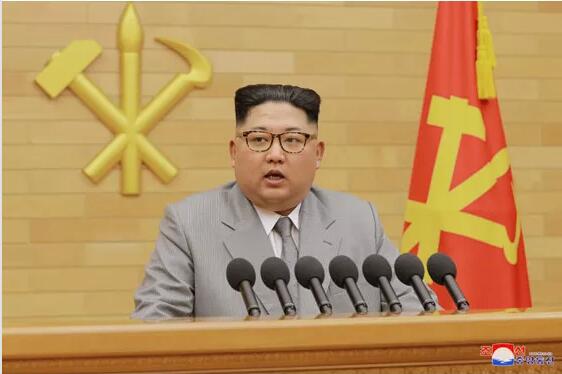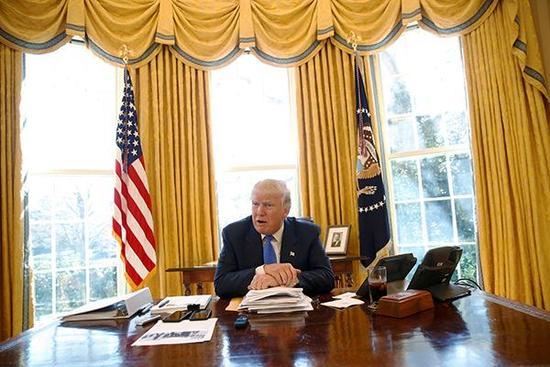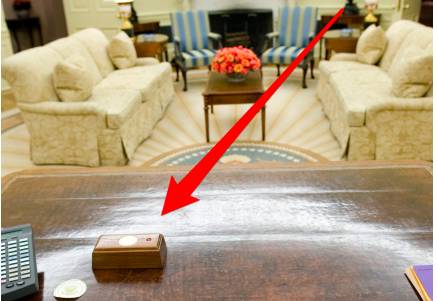


Kim Jong Un
On Tuesday, U.S. President Donald Trump threatened the Democratic People’s Republic of Korea (DPRK) on social media, saying that he too has a “nuclear button” on his desk and his button is “much bigger” and “more powerful.”
“North Korean Leader Kim Jong Un just stated that the ‘Nuclear Button is on his desk at all times,’” Trump tweeted. “Please inform him that I too have a Nuclear Button, but it is a much bigger & more powerful one than his,” the U.S. president said.
Trump’s outburst on social media comes after Kim Jong Un, the top leader of the DPRK, declared in a New Year’s Day speech that his nation is a nuclear power, which “no force and nothing can reverse.”
“In no way would the United States dare to ignite a war against me and our country,” Kim said. “The whole of its mainland is within the range of our nuclear strike and the nuclear button is on my office desk all the time.”


In fact, Trump does have a red button on his desk, but its purpose is much more benign. In an interview with The Associated Press, Trump revealed its purpose: to order a Coke. “With the push of a red button placed on the Resolute Desk that presidents have used for decades, a White House butler soon arrived with a Coke for the president,” the AP reported.
Social media users were quick to troll the U.S. president for bragging about the size of his nuclear button. “Also there’s a red button for Diet Cokes,” said The New York Times’ Maggie Haberman. “No no that one brings Diet Coke. You have to use the phone for the nukes,” said The Daily Wire’s Ben Shapiro. “Is it right next to the Diet Coke button? Please be careful!” wrote actor and comedian Kumail Nanjiani.
But on a more serious side, the “mine is bigger than yours” hostility from the U.S. president is unhelpful. “Spoken like a petulant ten year old,” said Eliot Cohen, a professor at Johns Hopkins University’s School of Advanced International Studies (SAIS).
As one of the most powerful countries in the world, the United States has an important role to play in promoting peace and prosperity.
China has stressed that the Korean Peninsula nuclear issue should be resolved peacefully through dialogue and consultation. Just yesterday, China’s Ministry of Foreign Affairs encouraged dialogue. “We encourage the two sides, as major parties concerned, to resume dialogue and build mutual trust and make concrete effort to bring the issue back to the right track of settlement through dialogue and consultation at the end.”
We will unleash “fire and fury” against you. The U.S. military is “locked and loaded.” We will “totally destroy” you. My “nuclear button” is bigger (and better) than yours. Such threats are not conducive to building trust and resolving the thorny issue. As Cui Tiankai, China’s ambassador to the U.S. pointed out, the U.S. should refrain from making threats and do more to find effective ways to resume dialogue and negotiation.
 Fire brigade in Shanghai holds group wedding
Fire brigade in Shanghai holds group wedding Tourists enjoy ice sculptures in Datan Town, north China
Tourists enjoy ice sculptures in Datan Town, north China Sunset scenery of Dayan Pagoda in Xi'an
Sunset scenery of Dayan Pagoda in Xi'an Tourists have fun at scenic spot in Nanlong Town, NW China
Tourists have fun at scenic spot in Nanlong Town, NW China Harbin attracts tourists by making best use of ice in winter
Harbin attracts tourists by making best use of ice in winter In pics: FIS Alpine Ski Women's World Cup Slalom
In pics: FIS Alpine Ski Women's World Cup Slalom Black-necked cranes rest at reservoir in Lhunzhub County, Lhasa
Black-necked cranes rest at reservoir in Lhunzhub County, Lhasa China's FAST telescope will be available to foreign scientists in April
China's FAST telescope will be available to foreign scientists in April "She power" plays indispensable role in poverty alleviation
"She power" plays indispensable role in poverty alleviation Top 10 world news events of People's Daily in 2020
Top 10 world news events of People's Daily in 2020 Top 10 China news events of People's Daily in 2020
Top 10 China news events of People's Daily in 2020 Top 10 media buzzwords of 2020
Top 10 media buzzwords of 2020 Year-ender:10 major tourism stories of 2020
Year-ender:10 major tourism stories of 2020 No interference in Venezuelan issues
No interference in Venezuelan issues
 Biz prepares for trade spat
Biz prepares for trade spat
 Broadcasting Continent
Broadcasting Continent Australia wins Chinese CEOs as US loses
Australia wins Chinese CEOs as US loses